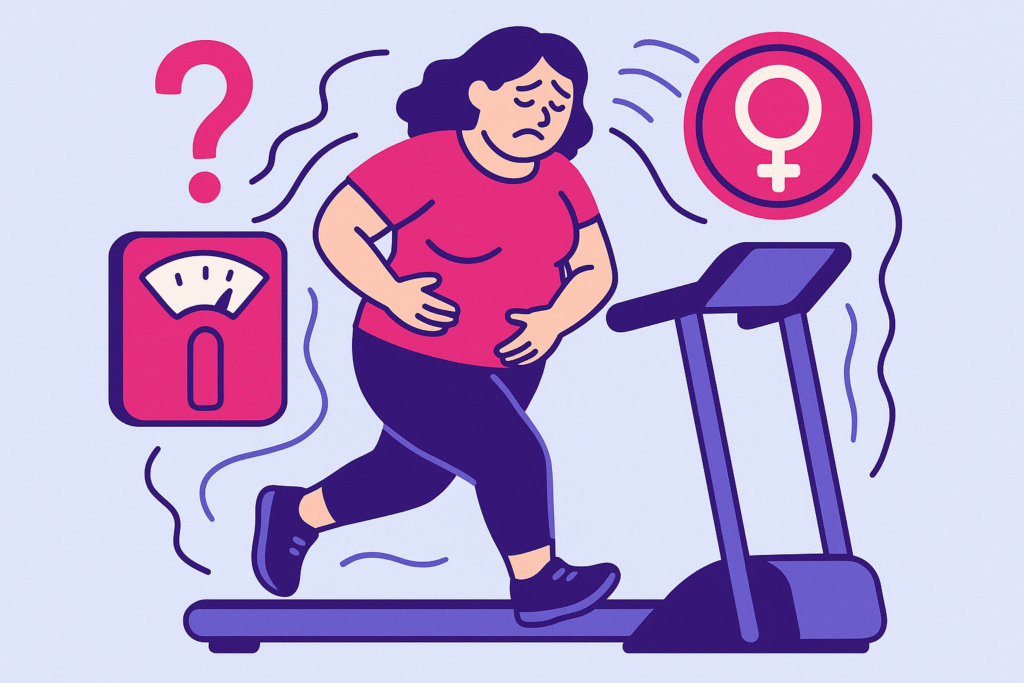Weight gain is one of the most common concerns for women during menopause. Even those who maintain the same diet and activity levels may gradually gain weight—especially around the abdomen. This phenomenon has biological explanations and is not simply a matter of “lack of willpower.” Fortunately, there are effective strategies that help maintain a healthy figure despite hormonal changes.
Why Do Women Gain Weight During Menopause?
The decline in estrogen and progesterone levels affects many metabolic and physiological processes. Key factors include:
Slower Metabolism
After the age of 45, basal metabolic rate decreases—the body burns fewer calories at rest¹. Loss of muscle mass (sarcopenia) further lowers caloric needs².
Hormonal Changes
Estrogens regulate fat distribution. Their deficiency promotes fat accumulation around the abdomen rather than in the hips and thighs as before³.
Insulin Resistance and Blood Sugar Fluctuations
Many women develop reduced insulin sensitivity, which facilitates weight gain, especially after eating carbohydrates⁴.
Stress and Lack of Sleep
Chronic stress raises cortisol levels—a hormone that promotes visceral fat accumulation⁵. Sleep problems also contribute to weight gain⁶.
Reduced Physical Activity
As people age, many become less active—working sedentary jobs and avoiding the gym, which only worsens the problem.
How Much Weight Can Be Gained and How to Prevent It?
Studies show that the average woman gains about 2.5–4.5 kg (5–10 lbs) in the first few years of menopause⁷. This is not always fat—some changes result from water shifts and altered body composition. However, weight gain increases the risk of:
- Hypertension
- Type 2 diabetes
- Heart disease
and certain cancers (breast, endometrial)⁸.
Thus, weight control is not only an aesthetic issue but also a health priority.
How to Avoid Weight Gain After 45? Proven Strategies
1. Adjusting Diet to a Slower Metabolism
- Reduce daily calorie intake by 200–400 kcal
- Avoid simple sugars and processed carbs
- Eat plenty of fiber (vegetables, whole grains) – it regulates appetite and blood sugar
- Include healthy fats (olive oil, nuts, oily fish)
- Limit alcohol and salty snacks
2. Increasing Physical Activity
- At least 150 minutes of moderate exercise per week (e.g., brisk walking, dancing, Nordic walking)⁹
- Strength training 2–3 times a week – helps maintain muscle mass and burn calories
- High-intensity interval training (HIIT) improves insulin sensitivity and reduces visceral fat¹⁰
3. Monitoring Body Weight and Waist Circumference
- Don’t rely on weight alone – waist circumference (<88 cm for women) is more important
- Take monthly measurements, record changes – awareness boosts motivation
4. Supporting Hormonal Balance
- Consume phytoestrogens (soy, flaxseed)
- Consider supplements like vitamin D, magnesium, and omega-3 fatty acids
- Consult your doctor about hormone replacement therapy (HRT) if symptoms are severe and affect metabolism
5. Managing Stress and Sleep
- Sleep at least 7 hours per night
- Avoid screens in the evening, establish a relaxing bedtime routine
- Practice yoga, meditation, or breathing techniques (e.g., 4-7-8)
6. Keeping a Nutrition and Activity Journal
- Apps like Yazio, Fitatu, or MyFitnessPal help track calories
- Journaling helps identify whether you eat due to emotions or true hunger
When to See a Specialist?
If you can’t lose weight despite trying or continue to gain weight, consider consulting:
- A clinical dietitian (for a personalized plan)
- An endocrinologist (to rule out hormonal or thyroid disorders)
- A gynecologist (to assess sex hormone levels)
Summary
Weight gain during menopause is common, but not inevitable. The key to maintaining a healthy body weight is adapting your lifestyle to the new hormonal and metabolic conditions. Proper diet, exercise, sleep, and stress reduction are factors that together can stop the “menopause belly” effect and improve long-term health.
Przypisy
- Poehlman ET. Menopause, energy expenditure, and body composition. Acta Obstet Gynecol Scand Suppl. 2002.
- Sirola J, Kröger H. Life-long skeletal health and aging. J Musculoskelet Neuronal Interact. 2005.
- Lizcano F, Guzmán G. Estrogen deficiency and the origin of obesity during menopause. Biomed Res Int. 2014.
- Lovejoy JC. The influence of sex hormones on obesity across the female life span. J Womens Health. 2003.
- Epel ES et al. Stress and body shape: stress-induced cortisol secretion and central obesity. Psychosom Med. 2000.
- Chaput JP et al. Lack of sleep as a contributor to obesity in adolescents. Int J Obes. 2006.
- Davis SR, Castelo-Branco C. Weight gain at menopause: the role of hormones and lifestyle. Climacteric. 2012.
- Lobo RA. Metabolic syndrome after menopause and the role of hormones. Maturitas. 2008.
- CDC. Physical Activity Guidelines for Americans, 2nd edition. 2018.
- Talanian JL et al. Exercise training and fat metabolism in postmenopausal women. J Appl Physiol. 2007.

